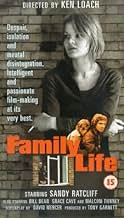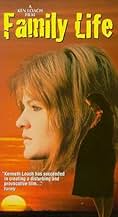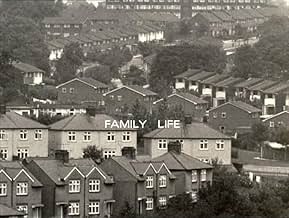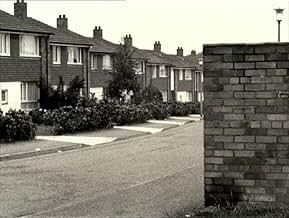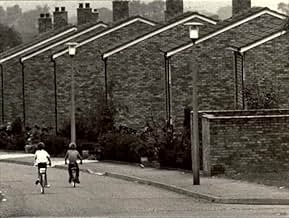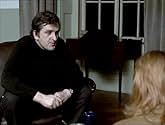अपनी भाषा में प्लॉट जोड़ेंA family is shattered over the daughter's forced abortion. As she rebels against her family and their traditional, authoritarian, typical-of-the-time norms, she is hospitalized and otherwise... सभी पढ़ेंA family is shattered over the daughter's forced abortion. As she rebels against her family and their traditional, authoritarian, typical-of-the-time norms, she is hospitalized and otherwise mistreated.A family is shattered over the daughter's forced abortion. As she rebels against her family and their traditional, authoritarian, typical-of-the-time norms, she is hospitalized and otherwise mistreated.
- 1 BAFTA अवार्ड के लिए नामांकित
- 6 जीत और कुल 1 नामांकन
- Barbara Baildon
- (as Hilary Martin)
फ़ीचर्ड समीक्षाएं
This was released in 1971, that is right after the swinging sixties and there is abundant reference to the counter-culture movements and the hippie revolution. Janice's parents are conservative Christian working class people who look down upon the new ways of the new times. They want their daughter to do 'what's good for her' as long as what she does conforms to their rigid idea of 'good'. After Janice gets forced to abort her unborn child by them, she slowly and gradually disintegrates and becomes a mere shadow of her former self. Her rights get taken away from her and she succumbs to the pressure of rigid traditionalism.
Loach doesn't do anything flashy with the camera. As a matter of fact I can't remember a single shot in the film that seeks attention. It's very understated. Loach uses the quintessential kitchen-sink drama approach and allows the scenes to progress with the help of strong dialogue instead of visual poetry. Although there is one distinct poetic scene where Janice goes on a sweet spray painting spree and we see a look of sheer joy on her face, for a change. This moment reminded me of the scene in Loach's 'Kes' where Billy explains his bird's habits to his classmates and for the first time, we can distinctly hear a new sense of passion in his voice.
The screenplay I think has some weaknesses. The timeline gets muddled up unnecessarily at the beginning which makes it a bit confusing to get a grasp of the timeline and the order of the events. Secondly, although there is an attempt made to explore and humanise the parents towards the beginning of the film with a scene involving the father somewhat opening up to the doctor about his marriage and family life, however those efforts get abandoned completely and the parents gradually become more and more hate- worthy due to their constant reprehensible actions and words. I feel Loach and his screenwriter could have tried to humanise the parents a bit more which thereby would have added more complexity to the film instead of making them completely antagonistic.
The tone set by Loach is naturalistic and the acting is likewise. The conversations and verbal exchanges are acted out and staged with an admirable air of authenticity. Sandy Ratcliff deserves a special mention. She convincing manages to portray a mentally troubled and depressed individual without the clichéd mannerisms that some actors resort to for selling a state of mental imbalance. She managed to make me really care for her character which is necessary for this role.
'Family Life' isn't a perfect film, but it is certainly worth watching.
The film is based on one of Wednesday Plays' most remembered episodes "In Two Minds" also directed by Ken Loach and written by David Mercer and dealing with a girl named Kate, living under the constant psychological pressuring of her parents and after a forced abortion, let her mind drift toward schizophrenia. The film version starring Sandy Ratcliff is clearly a reworking on the same subject but also an improvement.
For one thing, I think the use of color makes the difference, while the original was in black-and-white and could effectively convey the documentary-like aspect especially with the constant reliance on interviews, it gave a rather nightmarish, almost horror-like tone like one of these archive footage or stolen image from medical centers, as unsettling as that video where scientists test the effect of LSD on a poor cat. It was still a powerful film and I couldn't believe Darren Aronofsky didn't base Sara's demise in "Requiem for a Dream" from the fate of poor Kate (played by Anna Cropper).
But "Family Life" is much closer to Cassavetes' "A Woman Under the Influence" (and Janice is indeed under the influence) and getting back to colors, the beige and pastel tones create a startling contrast between Janice's state and the dullness of the environment she was brought up in, a bourgeois little house whose conformity is too clean to fool us. It's indeed an ordinary environment, not the kind that would lead to any trauma or alienation but Loach deliberately emphasizes the normality to demonstrate how problematic it was, if not for the parents but for Janice or her generation.
The film opens with one of Loach's trademark, Janice (Sandy Raitcliff in her debut) talks a little about herself to her psychiatrist Dr. Donaldson (Michael Riddall). She's a pretty 19-year-old girl, with a boyfriend named Tim (Malcolm Tierney) and again it's less in the things she say than the way she does or what she doesn't say that we can have our few glimpses on her emotional troubles. The editing is uncertain since we never really tell when it's a flashback or not but the first part clearly establishes the confusion within her mind and the causes of her troubles: an abortion she didn't want to have.
From her parents' reaction we can see the tragic paradox, they ask her to behave responsibly but they treat her as an irresponsible girl who can't make up her mind. The point of Loach is to show that sometimes madness isn't something you're born with but with the reaction to an education that forces you to behave in a way that contradicts your own prospects in life, leading you to a point where you simply don't know where to go. The father is played by Bill Dean and the mother by Grace Cave and the tragedy is less in their constant blaming of Jan's behavior but the fact that they don't realize the 'gaslighting' effect on her already fragile psyche.
Mrs. Baildon is certainly the most memorable character, so conservative it's scary, when she visits the doctor she deplores that his secretary calls his by his first name, which should be the least of her concerns. When the father is asked to talk about sex, he eludes the question in a way that confirms this isn't exactly the cement of his marriage. In a way, he did also conform to his wife's values. Taken separately, the parents become more approachable, almost as fragile as their daughter, in fact it's only when they're together that they form that 'two-headed' monster that Jan can't fight alone, leading her to the only viable solution: medical treatment. I didn't expect much from the medical world after witnessing how disastrous the welfare system worked in "Cathy Come Home" and indeed, the remedy proved even worse than the disease.
Yet the film's most brilliant moment came from a simple dinner scene with Janice's sister (Hilary Martin) and the verbal escalation that made me think of Ingmar Bergman's "Scenes from a Marriage". The scene isn't just magnificently directed and edited with that crescendo leading to the inevitable clash but also because it for once puts the parents in the accused box and for once they have to answer for their behavior. The mother tries to get away with it by proposing some jelly to her granddaughters and the father doesn't answer the content but the tone, asking for more respect because as a father, he's earned it. These usual rhetorical tricks highlight the sad reality of this family: when parents are too blind to see the disastrous effects of their education, any questioning would lead to a dialogue of the deaf.
Overall, the directing is forceful and Loach so at ease with his cinema-verité roots that some bits of surrealism were unneeded (like the blue painting scene). The realism culminates dramatically with the electroshock and this unforgettable conclusion where Janice is exposed to the medical students in an amphitheater like in a freak show. The film cuts abruptly as if the point was already made but maybe it should have emulated "In Two Minds" with the question sessions during the ending credits (I find the original ending more affecting).
"Family Life" invites us to question the crucial role of parenting in the way it shapes children's adulthood, parenting shouldn't be moulding but understanding. Generation gap is a reality that can't be dismissed and there are many sequences showing the youth of the 70s, long-haired rebels without a cause and I guess the point is to show that these kids live in a present and their parents try to educate them with values inherited from the past, consider the social evolution from the 20s to the 70s and you'll get the core of that lose-lose situation and incidentally, Janice's tragedy.
This film does have some touching moments but, alas, the ending is not a happy one. Which is especially a shame as the film does occasionally allow a faint glimmer of hope shine through.
क्या आपको पता है
- ट्रिवियाDirector Bille August cites "Family Life" as one of his greatest influences.
- भाव
Mrs. Baildon: Well, this is the thing that baffles me, Doctor, um, she really was quite a model child, she was tidy, in fact, I used to go into her bedroom some mornings and it-it was so tidy, it really didn't look as if anyone had been in there.
- कनेक्शनFeatured in Aquarius: Gnome Sweet Gnome/Family Life/The Great Waltz (1972)
टॉप पसंद
- How long is Family Life?Alexa द्वारा संचालित

